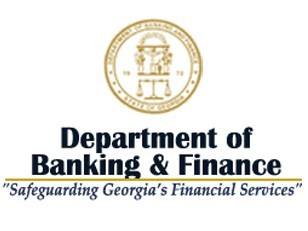Among states with the highest number of bank failures only Georgia has reduced oversight, according to an Associated Press review and interviews with state officials. Since Oct. 1, 2000, 40 banks in Georgia have collapsed.
"Is this a time to be having fewer bank examiners?" asked Joe Brannen, president of the Georgia Bankers Association. "I think just about everyone you ask would say no."
Over the last two years six Georgia bank examiner positions have become vacant and haven't been filled, a review of state budget documents found. During that same period, 32 Georgia banks have gone under, according to the Federal Deposit Insurance Corp.
The latest, Satilla Community Bank based in Saint Marys, was shut by federal regulators earlier this month.
Walt Moeling, an Atlanta-based banking lawyer, said that if the state had spent adequate money on banking oversight, "the present crisis we've had in the banking system may not have been so strong."
He labeled it "deregulation through attrition."
California, Florida and Illinois - states with the highest number of failed banks behind Georgia - have not reduced oversight positions, state officials said. California, however, has implemented furloughs as a result of its own budget problems.
In Georgia, critics say the Georgia Department of Banking and Finance has been chronically underfunded. The state has 61 bank examiners overseeing 250 lending institutions in conjunction with the FDIC. That's down from 95 state bank examiners in 1994.
"This is not the direction to be moving," said John Ryan, executive vice president of the Arlington, Va.-based Conference of State Bank Supervisors.
Ryan said the credit and liquidity problems affecting the nation's banks are far from over and more failures are likely. Last week alone, four banks failed in California, Minnesota, Arizona and Florida.
In the last decade, Georgia has seen tremendous changes within the banking industry. As the number of regulators has declined, more than 100 new banks have sprung up around the state, many of them small, boutique operations catering to a particular region or clientele. Mergers and collapses have kept the overall number of banks steady but given state regulators even more to do.
State banking commissioner Robert Braswell acknowledged the workload has grown for the state's banking examiners although he could not say by how much.
Braswell declined to be interviewed for this story and answered questions through e-mail.
In a statement, Braswell said he's "very proud of the way that the department's staff has stepped up to address the increased workload that comes with this extremely challenging environment."
"Despite the budget constraints, the department will continue to fulfill its mission to regulate the financial industry in Georgia," he said.
Like many states, Georgia has struggled to close a budget shortfall as the economy has soured.
In the budget proposed by Georgia Gov. Sonny Perdue and approved by the state Legislature, the Georgia Department of Banking and Finance sustained an overall funding cut of about 6 percent. That prompted the department to decide against filling the six vacant examiner positions. The examiners are responsible for auditing the books of financial institutions.
In addition, all examiners have been forced to take six unpaid furlough days in the current fiscal year to save money.
Unlike most state agencies, Georgia's banking department is funded not with taxpayer money but with fines and fees from the lending institutions it regulates. Overall revenue from the fines and fees has remained strong, but the department doesn't get to keep all it collects. The fees brought in $20.7 million in the fiscal year 2009. Of that, state legislators appropriated just $11.6 million back to the department - a proportion that has held for the past several years.
Legislators have tapped the rest of the money collected by the department to pay for other things throughout state government.

http://accesswdun.com/article/2010/5/229552
